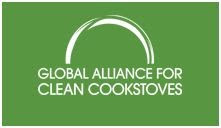The Global Alliance for Clean Cookstoves led by the United Nations Foundation, will bring together leading foundations, non-profit organizations, academic institutions, corporate leaders, governments and UN agencies to help overcome current barriers and stimulate a thriving global market for clean cookstoves, says a Global Alliance for Clean Cookstoves Press Release.
The Global Alliance for Clean Cookstoves is a $60 million dollar public-private partnership to save lives, improve livelihoods, empower women and combat climate change by creating a thriving global market for clean and efficient household cooking solutions. Exposure to smoke from traditional stoves and open fires – the primary means of cooking and heating for 3 billion people in developing countries – causes almost 2 million deaths annually, with women and young children affected most. That is a life lost every 16 seconds.
The Alliance’s goal is for 100 million homes to adopt clean and efficient stoves and fuels by 2020.
This was announced by U.S. Secretary of State Hillary Rodham Clinton today during the Secretary’s remarks at the Clinton Global Initiative forum.
"Today we can finally envision a future in which open fires and dirty stoves are replaced by clean, efficient and
affordable stoves and fuels all over the world -- stoves that still cost as little as $25,” said Secretary of State Hillary Rodham Clinton. “By upgrading these dirty stoves, millions of lives could be saved and improved. Clean stoves could be as transformative as bed nets or vaccines."
Cookstove smoke contributes to a range of chronic illnesses and acute health impacts such as early childhood
pneumonia, emphysema, lung cancer, bronchitis, cardiovascular disease and low birth weight. The smoke from inefficient stoves continues to contribute to global climate change by producing harmful greenhouse gas emissions such as carbon dioxide and methane, and aerosols such as black carbon. Reliance on biomass for
cooking and heating also increases pressure on local natural resources and forces women and children to spend many hours each week collecting firewood – an especially dangerous task for women and girls in refugee camps and conflict zones.
The use of efficient cookstoves can dramatically reduce fuel consumption and exposure to harmful smoke. Recent scientific evidence confirms that the greater the emissions reductions, the greater the health benefits. More efficient stoves also reduce the time people (usually women and girls) have to spend collecting fuel, and since stoves last for several years, the accumulated savings in time and cost can be invested back into families, communities and economies.
The reductions in emissions achieved by clean cookstoves have the potential to create revenues from carbon credits. Stove companies can use this revenue to reduce stove prices or expand into new markets. More broadly, the entire clean cookstove supply-chain should be a source of economic opportunity and job creation at the local level.
To achieve its ‘100 by 20’ goal, the Alliance will establish industry standards; spur innovative financing mechanisms; champion the cause across the donor and development communities; develop indoor air quality guidelines; address global tax and tariff barriers; field test clean stoves and fuels; and develop research roadmaps across key sectors such as health, climate, technology and fuels.
A thriving global industry for clean cooking solutions will provide a range of long-term benefits for the entire world –from improving global health to combating climate change.
Alliance Founding Partners
United Nations Foundation, Shell Foundation, U.S. Environmental Protection Agency, U.S. Department of State, World Health Organization (WHO), German Federal Ministry for Economic Cooperation and Development, Deutsche Gesellschaft für Technische Zusammenarbeit (GTZ) GmbH, Morgan Stanley, UN-
Energy, World Food Programme, UN Environment Programme (UNEP), UN Industrial Development Organization, U.S. Agency for International Development (USAID), U.S. Department of Energy, U.S. Department of Health and Human Services (National Institutes of Health, and Centers for Disease Control & Prevention), UN High Commissioner for Refugees, SNV: Netherlands Development Organisation, Shell, Government of Peru, Government of Norway.
Photo Courtesy: Global Alliance for Clean Cookstoves
skip to main |
skip to sidebar
THE READING LIST
- World Lung Foundation: Acute Respiratory Infections Atlas
- Searching for Fundi and studying the three-stone stove in Kalinzi
- Karibu Tena: Rocket Stoves in Mwamgongo
- Black Carbon Emissions in Asia
- Capacity Development for Scaling Up Decentralized Energy Access Programmes: Lessons from Nepal on its role, costs, and financing
- The Indian National Initiative for Advanced Biomass Cookstoves: The benefits of clean combustion
- The Hartwell Paper: A new direction for climate policy after the crash of 2009
- PERU HEALTHY KITCHEN/HEALTHY STOVE PILOT PROJECT
- US Climate Bill: Kerry Lieberman' American Power Act
Followers
Blog Archive
-
▼
2010
(93)
-
▼
September
(11)
- Spreading Clean Air
- The Silent Killer Now A Global Concern
- Shell Pledges $6 Million For Global Clean Stove In...
- UN-Led Global Alliance for Clean Cookstoves Launch...
- Secretary Clinton's Speech At The Launch of the G...
- Secretary Clinton to Announce Global Alliance for ...
- Indoor Air Pollution: A Video
- Cornell Research on Biochar and Cook Stoves Gets F...
- Studying The Three-Stone Stove In Kalinzi
- US EPA Makes Cookstoves A Priority
- X PRIZE, Indian Government, IIT Delhi to Partner...
-
▼
September
(11)
IMPROVED COOK STOVES
VIDEO RECORD
Enterprise Based Solutions for Improved Cook Stoves
Routes to Market for Improved Cook Stoves
Shell Foundation Press Conference on Indoor Air Pollution
Interview Jeroen Blum, Deputy Director, Shell Foundation
Clearing the Air on Indoor Air in Koppal
Khidki Amma Noses Around
Envirofit Cookstove Ambassador Minniamma
South India Pilot Campaign
Shell Foundation Campaign in Shimoga
Secretary Clinton Announces the Global Alliance for Clean Cookstoves
The Burden of Firewood
The Silent Killer In The Kitchen
The Stove Solution
The Stove Solution
The Aprovecho Institutional Rocket Stove
Step by step guide to build a RIPPLE Rocket fuel efficient cookstove
Malawi – The RIPPLE Rocket fuel efficient cookstove





